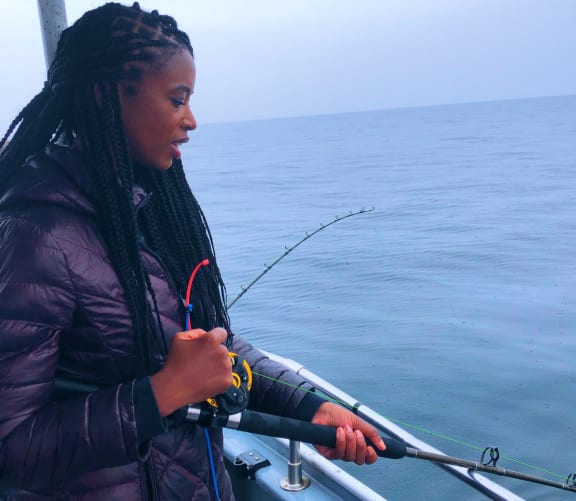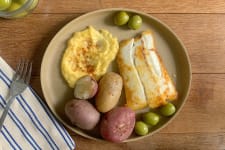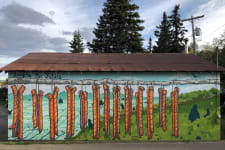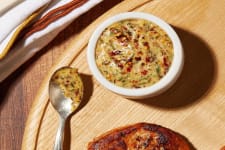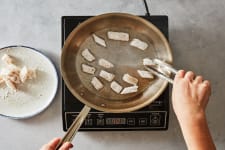I want to share one more Q&A with you while I’m out on leave, to better acquaint you with some of the Wild Alaskan team members that keep the WAC ship sailing on smooth seas.
In observance of Black History Month, we chatted with Emeliem Ogbolu, WAC’s Director of Talent, about her intergenerational connection to Alaska, about the food traditions that tell the story of her family, and about her approach to cooking at home.
Emeliem is the consummate home cook, with a curiosity around food that inspires her to explore new flavors and build connections around the kitchen table. (Emeliem, if you’re reading this, we’re awaiting an invitation to dinner!) Emeliem is currently based in Brooklyn, NY.
Where did you grow up?
I’ve moved all over the place, but I spent most of my younger years in Philadelphia. I moved to Appalachia after that, then applied for boarding school because I didn’t love the area. I went to high school in an all girls’ boarding school outside of DC. As an adult, I spent some time back in Philly and lived in Berlin for a year.
As for my parents, my mother is from New Jersey and my dad is from Nigeria — he landed in Alaska when he first came to the US.
Wow, Nigeria to Alaska! What was that move like for your dad?
My dad was one of the first Nigerians that ever came to Alaska, in the early 80s to attend school in the US. At the time, Alaska had more relaxed policies for immigration than other parts of the country. One thing a lot of people outside of Alaska don’t know is that Anchorage is one of the most diverse cities in the U.S.
My dad ended up going to school in Anchorage. When he first arrived, he didn't have a coat. He had to rely on the generosity of Alaskans — they took him in, drove him to work. Ever since then, he’s had this deep appreciation for Alaskans, for their help and hospitality. He really got set up there with the generosity of strangers.
I’ve been on the receiving end of Alaskan generosity, too. When I first traveled to Alaska about 10 years ago, I also didn't have the proper outerwear! I found myself having to borrow a coat and I was like, “It must run in the family. The same thing happened!”
Speaking of Alaska, what is your favorite species of wild-caught seafood?
I became obsessed with sablefish after joining the WAC team, but it changes every week. One week it’ll be Weathervane Scallops, the next week I’m really into Pacific halibut, then I’m really into salmon.
I like spot prawns when I can get them, because they’re the gift that keeps on giving. No part of it goes to waste. When I saw the roe for the first time, I was amazed! I also use the shells for stock.
Did anyone teach you how to cook? Where did you learn how to make your way around the kitchen?
My mother is an amazing cook. She cooks everything. When I was younger, I wasn’t interested in cooking, but I had higher standards because of what she made.
Food was a way that we connected as a family. One food memory that comes to mind is when my entire mom’s family would get together, steam blue crabs, and crack them open. I also remember my mom taking me to get these amazing Italian hot dogs. We were in Northern Jersey, so Italian hot dogs — they’re a staple.
I feel like the more you eat and try things, you begin to understand what’s possible — and this sets the bar higher. I also learned a lot by watching cooking shows.
What do you always have in your own home kitchen? Any pantry staples?
Miso, for everything, even in butternut squash soup. It just kicks every meal up. I always have some kind of frozen, homemade stock — usually some kind of seafood stock. And I always have fresh garlic and ginger. I cook every single day, so the list could go on and on and on. Oh, one more thing: smoked paprika!
I also love using a mortar and pestle. There’s something that feels really artisanal about grinding your own spices. It also makes everything taste better.
Are there any foods or kitchen skills that you’re interested in learning more about?
There’s a group of folks called the Gullah Geechee who live in the low country of the U.S. — in Georgia, South Carolina, Florida. They’re descendants of enslaved people and indigenous people. Because their communities are off the mainland, the Gullah Geechee have been able to retain their own language, their own cuisine, and their own culture. Some of the descendents are working to retain that culture today.
Gullah Geechee food is a combination of West African food and low country food, with a strong emphasis on seasonality and fresh fish and shellfish. The seafood dishes are amazing.
I also want to get better at things like knife skills, general execution of recipes — like making sure the skin of salmon or sablefish is crisped just so.
So what’s dinner like at your place these days?
I have a dining area with a huge table. I have a neon light that says “No wahala” that is hung over the dining area — it’s a Nigerian expression. No wahala means no worries. Almost like “hang loose,” or no trouble.
Live Wild,
Monica
Anchor Points newsletters are a moment during the week for me to share with you what I see outside my window in Alaska and beyond. They’re also a window into the culinary happenings within the Kallenberg household, where our family meals revolve around wild-caught seafood in Alaska. As I’m currently out on maternity leave, please enjoy revisiting some of my all-time favorite newsletters.
Pictured above: Emeliem in Alaska, dropping a line into Kachemak Bay to catch Pacific halibut.
